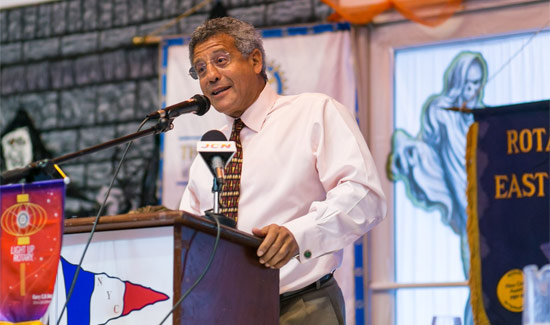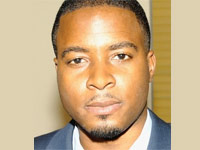The press pass many journalists have generally given Branville McCartney is best understood with regard to the media’s perpetual hunt for ratings and sales, boredom and hunger for headlines, as well as its own ignorance of Bahamian history and often incurious nature.
But there is only so much of a pass the public can give the press in terms of the latter’s disregard for some of the basics of competent let alone good journalism. One story in particular from last week showcased the media’s laziness when it comes to providing the public with greater context.
In an interview for the NB 12 newscast, the self-appointed leader of the Democratic National Alliance claimed that his party started the same way as the PLP and FNM. Not only did the reporter fail to query such a bold claim during the interview, but there was also no post-interview fact-check of McCartney’s bogus claim.
There are various conclusions one may draw from McCartney’s bold and bogus claim. Either he was purposefully misleading the public or is stunningly ignorant of Bahamian political history – or both! Whatever the case, they all speak to the question of McCartney’s credibility, which seemingly erodes the more he speaks.
It may be the case that, stung by questions of the democratic pedigree of his DNA, McCartney is retroactively seeking to baptize his self-creation as legitimate in the eyes of voters.
TROUBLING
His response to the NB 12 reporter once again reveals troubling character traits of some – one selling himself as a future prime minister. If McCartney knowingly was untruthful, this may suggest a cavalier approach to the truth and the facts, which he may not want to get in the way of the story he is trying to weave about himself as change agent and savior of The Bahamas.
If the man who has narcissistically and alternatively cast himself as Barack Obama, a young Lynden Pindling and a young Hubert Ingraham, simply got his history wrong, his comparisons with these leaders is laughable at best.
The self-portrait McCartney has painted of himself through his lacklustre contributions to debates in the House of Assembly, glib remarks generally and his maiden speech at the launch of his DNA is not a pretty one. They show him to be incurious and shallow both intellectually and in terms of basic history.
The other compelling problem for the man who purports to be a committed democrat is that he has already exhibited the tendencies of the maximum leader of a party being created in his own image and likeness.
One should always watch how things begin. Having launched his vanity party the way he has, one can only imagine how McCartney might re-act in the unlikely event he should gain real power. Instead of endless public relations exercises and stunts, McCartney might want to open and finish a history book, not to mention a basic civics class.
Queried about the genesis of the DNA, McCartney says that 13 people got together and made him leader. If one closes one’s eyes, one can almost imagine the scene in an upper room somewhere. With a little more imagination one might imagine a beam of light from the heavens, green of course, descending on McCartney as the chosen one.
NO WAY
The manner and circumstances in which the DNA was formed can in no way be compared with the manner and circumstances in which the PLP and the FNM were formed. Branville McCartney broke with the FNM with the principal motivation being that he wanted to be leader and prime minister.
Neither the PLP nor the FNM was a vanity party founded by someone who wanted to be a leader or prime minister, who then decided to create a vehicle to achieve that objective, as has been the case with the DNA and most of the so-called third parties that have come and gone over the years.
The PLP came into being following discussions among a number of persons who felt that the time had come for the introduction of party politics to the country as a means of expressing the collective will of the Bahamian people.
Two founders of the PLP, Cyril Stevenson and William Cartwright, travelled to the United Kingdom and Jamaica to consult with officials of political parties in those countries about the structure of modern political parties.
When the party was formed in 1953, Henry M. Taylor, who was then a member of the House of Assembly, was el-ected chairman by the founders and in 1954 Taylor and other officers were ratified by the convention. The PLP did not have a party leader until after the 1956 general election.
In that election Sir Henry lost his seat but stayed on as chairman. Lynden O. Pindling was among six PLP members elected in 1956 and he was at that time chosen to be leader. Later on, Sir Lynden for a while held both positions of chairman and leader.
In the case of the FNM, the Dissident Eight in 1970 expressed in a parliamentary vote their loss of confidence in the Leader of the PLP Sir Lynden. They were, however, reluctant to make a final break with the party to which all of them had given so much. In fact, at first they called themselves the Free PLP.
It was only after they were suspended from the PLP that they set about the task of bringing all the opposition forces together under the umbrella of a new entity – the FNM. That process took months and when it was finalized Sir Cecil Wallace-Whitfield, who was recognized as leader of the Dis- sidents, was elected leader by the FNM’s Central Council and later by the Convention.
PANDERING
Mr. McCartney is shaping up to be a demagogue pandering to the fears, anxieties and frustrations of voters, more of which in a subsequent column. Demagogues are often the antithesis of the things for which they claim to be fighting. Despite having named his vanity party democratic, the democratic legitimacy and credibility of the DNA is dubious.
The PLP and the FNM emerged much differently than the DNA. They also successfully came to office, an outcome that is highly unlikely to be the case for McCartney’s vanity affair.
McCartney should be chary of those who are now boosting him out of temporary grievances, or long-term dubious theories about the great rise of independents and third parties. While there are increasingly nonaligned voters, the idea that they will help a strong third party emerge as a powerbroker is wearisome and has proved consistently wrong.
In that year’s general election, there was talk by some that 1997 would be the year of the independents. Not only was 1997 not the year of the independents, but that year the FNM got its largest popular vote ever.
There is a stark difference between educated analysis based on history, and wishful thinking as a substitute for analysis. McCartney would do well to quickly learn some basic historical facts, which are essential in proffering reasonable historical analysis.
By: Simon
From the “Front Porch” column
Nassau Guardian/Freeport News



